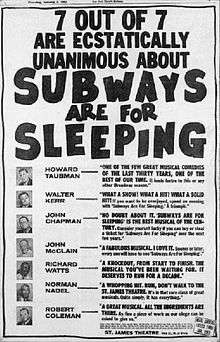Subways Are for Sleeping
| Subways Are for Sleeping | |
|---|---|
.jpg) Original cast recording | |
| Music | Jule Styne |
| Lyrics |
Betty Comden Adolph Green |
| Book |
Betty Comden Adolph Green |
| Basis | Edmund G. Love's article in Harper's and subsequent book |
| Productions | 1961 Broadway |
Subways Are for Sleeping is a musical produced by David Merrick with a book and lyrics by Betty Comden and Adolph Green and music by Jule Styne. The original Broadway production played in 1961-62.
The musical was inspired by an article about subway homelessness in the March 1956 issue of Harper's and a subsequent 1957 book based on it, both by Edmund G. Love, who slept on subway trains throughout the 1950s and encountered many unique individuals. With the profits from his book, Love then embarked on a bizarre hobby: over the course of several years, he ate dinner at every restaurant listed in the Manhattan yellow pages directory, visiting them in alphabetical order.
Synopsis
Angie McKay is a magazine writer assigned to write a story about a group of well-dressed homeless people sleeping in the New York subway system. Their leader is Tom Bailey, a one-man employment agency who finds other drifters odd jobs and sleeping quarters. To help research her story, Angie goes undercover and pretends to be a stranded girl from out-of-town. Trouble ensues when Tom discovers her real identity.
Broadway production
After two previews, the Broadway production, directed and choreographed by Michael Kidd, opened on December 27, 1961 at the St. James Theatre, where it ran for 205 performances. The cast included Orson Bean, Sydney Chaplin, Carol Lawrence, Gordon Connell, Grayson Hall, and Green's wife Phyllis Newman (whose costume, consisting solely of a towel, was probably Freddy Wittop's easiest design in his distinguished career), with newcomers Michael Bennett and Valerie Harper in the chorus.
Subways Are for Sleeping opened to mostly negative reviews. The show already was hampered by a lack of publicity, since the New York City Transit Authority refused to post advertisements on the city's buses and in subway trains and stations for fear they would be perceived as officially sanctioning the right of vagrants to use these facilities as overnight accommodations.

Producer David Merrick and press agent Harvey Sabinson decided to invite individuals with the same names as prominent theatre critics (such as Walter Kerr, Richard Watts, Jr. and Howard Taubman) to see the show, and afterwards used their favorable comments in print ads.Thanks to photographs of the seven "critics" accompanying their blurbs (the well-known real Richard Watts was not African American), the ad was discovered to be a deception. It was pulled from most newspapers, but not before running in an early edition of the New York Herald Tribune. However, the clever publicity stunt allowed the musical to continue to run and it eventually turned a small profit.
Newman won the Tony Award for Best Featured Actress in a Musical, and nominations went to Bean for Best Featured Actor and Kidd's choreography.
An original cast recording was released by Columbia Records. A revival production was briefly mounted in 2009.
Songs
|
|
Further reading
Wheels that hum by F. Gwynplaine MacIntyre, New York Daily News, May 19, 2004
External links
- Subways Are for Sleeping at the Internet Broadway Database
- Museum of Hoaxes Article about David Merrick and Subways
- talkinbroadway article about David Merrick and Subways